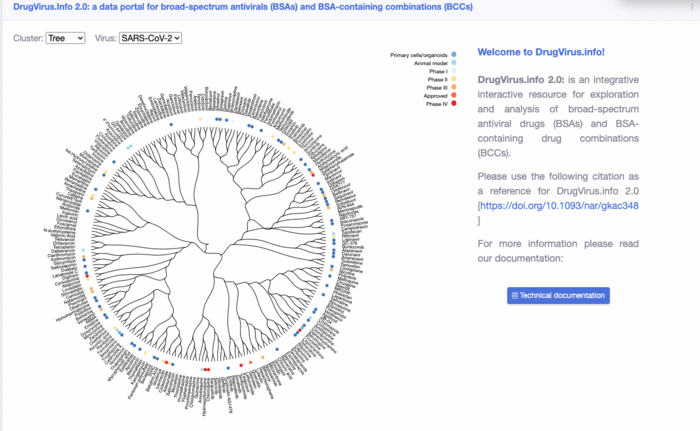Following two years of severe restrictions, everyone is eager to be done with the coronavirus pandemic. It’s tempting to think that COVID-19 is history, but the coronavirus and other viruses will regularly resurface.

Credit: Aleksandr Ianevski
Following two years of severe restrictions, everyone is eager to be done with the coronavirus pandemic. It’s tempting to think that COVID-19 is history, but the coronavirus and other viruses will regularly resurface.
What will we do the next time we have a major outbreak?
A research team at the Norwegian University of Science and Technology (NTNU) has been working hard to figure out the answer to this very question for the past six months.
Many patients treated with malaria medicine died
“During the coronavirus outbreak, a lot of people thought that malaria medicine might work. It took time to show that it wasn’t effective, and many patients died. Our solution can immediately determine which medicine will work or not,” says Denis Kainov, a professor of medicine at NTNU.
The solution is simply to reuse and redesign active ingredients that are currently used against various illnesses like cancer or HIV.
Researchers have looked at more than 11 000 active ingredients to find the medicinal mix that has the greatest potential to work. The researchers have incorporated information about the active ingredients into a digital system and created an algorithm that can pick out the best ones.
The digital system is openly available online. The solution can save millions of euros, more lives and help us avoid societal shutdowns.
But first a little background on what we are actually facing.
Viruses have a big head start
“We don’t have medicines for 200 viral diseases that can spread in humans,” says Kainov.
In other words, we have no medication that can prevent the viruses from multiplying when they start to spread. Developing vaccines for a virus that has not yet spread in humans isn’t possible since viruses are constantly mutating.
As with COVID-19, future outbreaks will have plenty of time to spread before a vaccine is readily available.
This is where the NTNU researchers come in with their reuse approach and a brand-new algorithm for developing antiviral drugs.
These are medications that attack the virus itself, and can knock it back right from the start.
Antiviral drugs simply prevent the virus from multiplying. The problem is that developing a new antiviral drug takes about 13 to 15 years and a staggering 20 million euros. Few such options therefore exist. Antiviral drugs currently make up only 4.4 per cent of 4 051 approved drugs.
The researchers at NTNU have now investigated all the existing possible active ingredients against viruses. These are molecules that have gone through some of the phases on the way to eventually having medicinal value.
Solution has potential to save many lives
The researchers have created a digital system called Drugvirus.info.
The system will give pharmaceutical companies and other researchers a head start in developing new treatments. Instead of spending research funding over many years, they will be able to cut back their spending to one year. Instead of spending millions on a new treatment, the cost will drop tenfold. NTNU’s system will also save companies enormous sums and save more lives.
“The system checks what active ingredients already exist that can be reused and redesigned so that we can slow down new outbreaks in the critical phase before a new vaccine is developed,” says Kainov.
Reference:
Aleksandr Ianevski, Ronja M Simonsen, Vegard Myhre, Tanel Tenson, Valentyn Oksenych, Magnar Bjørås, Denis E Kainov, DrugVirus.info 2.0: an integrative data portal for broad-spectrum antivirals (BSA) and BSA-containing drug combinations (BCCs), Nucleic Acids Research, Volume 50, Issue W1, 5 July 2022, Pages W272–W275, https://doi.org/10.1093/nar/gkac348
Journal
Nucleic Acids Research
DOI
10.1093/nar/gkac348
Method of Research
Literature review
Article Title
DrugVirus.info 2.0: an integrative data portal for broad-spectrum antivirals (BSA) and BSA-containing drug combinations (BCCs)
Article Publication Date
24-May-2022




